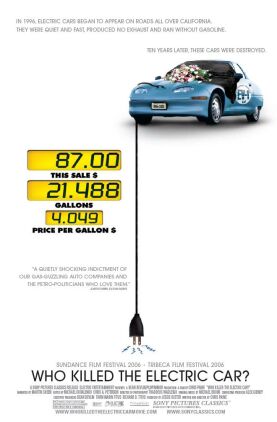Who Killed the Electric Car?
Who leaves Atlantis off the maps?
Who keeps the Martians under wraps?
We do! We do!
Who holds back the electric car?
Who makes Steve Guttenberg a star?
We do! We do!
The song of the “Stonecutters” from an episode of “The Simpsons” reminds us that electric cars and conspiracy theories go together in the popular imagination like CO2 emissions and global warming. Chris Paine’s documentary, Who Killed the Electric Car? rather disarmingly plays up to the stereotype by treating the demise of this particular electric car, GM’s EV1, as a murder mystery. For the film makes it clear that we are dealing with a murder rather than a natural death. Beginning with a mock funeral for the car in a Hollywood cemetery with environmentally- conscious movie stars delivering the eulogies, Mr Paine ticks off the suspects. The only one to be completely exonerated is the car itself, or at least its battery, which was initially somewhat inadequate.
Blame is shared among a number of other suspects, including consumers, car companies, oil companies and the state of California’s Air Resources Board (CARB), which mandated the construction of electric cars in the first place in 1990 only to rescind its own mandate in 2003. But the car companies, especially GM, come in for the biggest share of blame. The film makes much of GM’s deviousness in leasing rather than selling the EV1 so that, when the CARB and its director, Alan C. Lloyd, lifted the state mandate, it could make sure they were all taken off the road and, literally, shredded. So there isn’t much mystery about the who. GM killed its own product. What makes for the mystery in the eyes of Chris Paine and such stellar advocates of the EV1 as Tom Hanks, Mel Gibson, Peter Horton and Ed Begley Jr. — not to mention that veteran supporter of left wing causes, Martin Sheen, who narrates — is why GM would have wanted to destroy what they regard as such a terrific product.
The film offers us one explanation: parts. The electric car didn’t have any, to speak of. A mechanic tells us that maintenance of the EV1 left him with nothing to do but “rotate the tires and change the washer fluid.” As a large proportion of GM’s profits — if it had any profits — comes from parts and maintenance, you can see how the corporation might worry. Except that it seems counter-intuitive to suppose that success for its product could not be in the corporation’s best interest. Can this be possible? Let’s think of an analogy. If Coca Cola wants to get into the market for fruit juice, it can do so without fear that selling more fruit juice will mean that people stop drinking Coke, since there isn’t much overlap between the two markets. But if, say, Microsoft were to buy Apple Computer, it would do so only in order to kill it, since the more successful it was at selling Macs the more it would be undermining its core business.
I don’t know if the EV1 was the fantastic car that everyone in this movie says it was. It sounds just a little too good to be true that something so environmentally friendly could also be appealing to consumers who, unlike these movie stars, care more about looks or performance or economy or reliability or convenience than they do about environmental correctness. But the better it was, the more GM must have hated being required to be an accomplice in wrecking the market for its main products. Was it right for the state of California to interfere in the market in this way in the first place? You could make an argument that, if it is in everybody’s interest to have more people driving electric rather than gasoline-powered cars, government at any level should legislate, as California originally did, to make sure that more electric cars were available to consumers.
But it’s never that simple. Such government-dictated distortions in the market and limitations on profitability will always produce an equal and opposite reaction from those they affect — since governments cannot also mandate that electric cars be as profitable as the gasoline-driven kind. With a command economy, and profit taken out of the accounts, you could make the EV1 become for us what the Trabant was for East Germany under communism. But America’s free market was never going to stand that for very long. Who Killed the Electric Car? Who else but those whose business was most threatened by it, namely its manufacturer? But the whiff of mystery and paranoia with which Mr Paine’s movie artificially surrounds the question feeds Hollywood’s appetite for conspiracy and flatters the belief so common among the creatures of publicity and hype that, as one of them says here: “People will buy anything you can convince them to buy.” Insofar as that is not simply a tautology, it is an indication that those whose business is manipulation are likely to believe that all is manipulation. If you believe it too, this is the movie for you.
Discover more from James Bowman
Subscribe to get the latest posts to your email.







